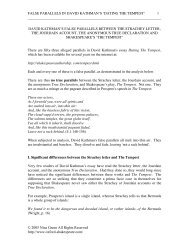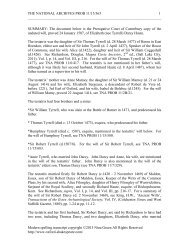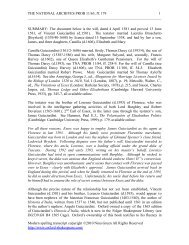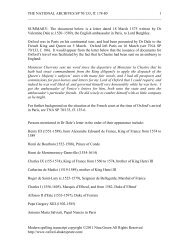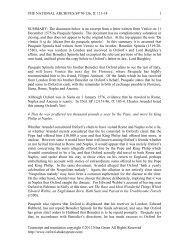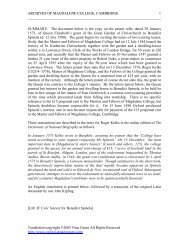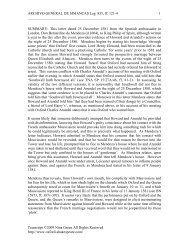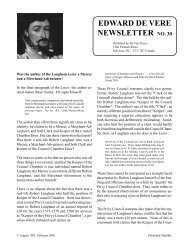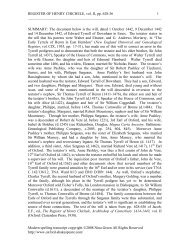GREENE'S FAREWELL TO FOLLY 1 Modern spelling tran
GREENE'S FAREWELL TO FOLLY 1 Modern spelling tran
GREENE'S FAREWELL TO FOLLY 1 Modern spelling tran
You also want an ePaper? Increase the reach of your titles
YUMPU automatically turns print PDFs into web optimized ePapers that Google loves.
GREENE’S <strong>FAREWELL</strong> <strong>TO</strong> <strong>FOLLY</strong> 32<br />
________________________________________________________________________<br />
of duty, and that the pill that purgeth the choler of a prince is revenge. This think, and<br />
farewell.<br />
Ninus, Monarch of Egypt.<br />
He committed this letter to the charge of one of his secretaries, whom he made privy to<br />
the contents, who posting in haste to the house of Semiramis found her bringing one of<br />
her babes asleep with a song. The secretary, delighted with the pleasing harmony of her<br />
voice, stood a little listening to her melody, at last stepped into the house, at whose<br />
presence the poor woman, amazed for that her cottage was not accustomed to such<br />
guests, she blushed, which gave such a glory to her former beauty and such a precedent<br />
of her inward virtue that the secretary envied the happy placing of his sovereign’s<br />
passions, yet after her homely fashion she entertained him, greatly fearing when he<br />
delivered her the letters that they had been some warrant to apprehend her husband for<br />
some fault, but by the superscription she perceived they were directed to her. Having set<br />
before ye secretary a mess of cream to busy him, she stepped aside to read the contents,<br />
which when she perceived and well noted the effects, not only alluring with promises but<br />
persuading with threats, she burst into tears, cursing that day where ye king had a sight of<br />
her face as dismal and infortunate, falling at last from tears into these fearful complaints:<br />
Are the destinies, poor Semiramis, forepointers of good or ill, so inequal allotters of<br />
mishap that some they bless with daily favours, and others they cross with continual hard<br />
fortunes? Had the fates no proportion in their censures? Could it not suffice thou wert<br />
poor but thou must be miserable? Cannot envy paint the picture of content at thy cottage<br />
door but she must grudge? Is there no shrub so low but it is subject to the wind, no<br />
woman so poor, if she be fair, but some, blazing her beauty, aimeth at her chastity?<br />
Then, Semiramis, be patient but resolute; rather choose despite and sorrow than disgrace<br />
and infamy. Is labour an enemy to love; how then should affection touch me, who am<br />
never idle? Therefore, fond fool, doth love envy thee because thou art not idle, but by<br />
labour showest thyself a recreant to his law.<br />
But yet, Semiramis, consider who it is that persuades thee to love, Ninus, a king, a<br />
monarch, and thy sovereign, one whose majesty may shadow thy miss, and whose very<br />
name may warrant thee from the prejudice of envy. If thou offend, dignity countervails<br />
the fault, and fame dare not but honour the concubines of kings. For shame, Semiramis,<br />
soothe not thyself in such follies. Are not kings’ seats objects for every eye to gaze at?<br />
Are not their actions censured by every base person? As the pyramids are marks for the<br />
sea, so their doings are notes for the world. Doth not fame build in the foreheads of<br />
princes? Yes, Semiramis, kings’ faults, though they are passed over with fear, yet they<br />
are judged of with murmur. The greater the dignity, the greater the offence. Shame<br />
followeth vice everywhere, and adultery, if laws were not partial, deserveth punishment<br />
as well in a king as in a beggar. Menon is poor, but thy husband; in loving him thou<br />
pleasest the gods. Ninus is rich, and a monarch; in contenting him thou dishonourest<br />
thyself, and discontentest the heavens. Hath Babylon counted thee fair? So thou art still<br />
by reserving thy beauty. Hath Babylon counted thee honest? So remain still by<br />
preserving thy chastity. Be not more chary over thy beauty than over thine honesty, for<br />
<strong>Modern</strong> <strong>spelling</strong> <strong>tran</strong>script copyright 2007 Nina Green All Rights Reserved




